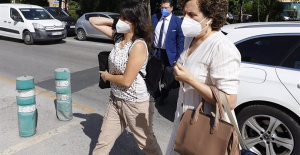MADRID, 15 Ago. (EUROPA PRESS) -
The Taliban promised to respect the rights achieved by women after the overthrow of the Islamic Emirate in 2001. A year later, it is already clear that all these commitments have fallen on deaf ears and UN Women accuses the current rulers of "meticulously" building " policies of inequality" that marginalize half of the population.
The executive director of this agency, Sima Bahous, perceives a "daily and continuous" deterioration of the Human Rights of women and girls, both in the public and even in the private sphere. There are no women in the Taliban cabinet, where the 'hardline' men continue to rule and adopt laws to suit them.
"It has been a year of growing disrespect for the right (of women) to live their lives as free and equal, denying them the opportunity to earn a living, access health care and education, and escape situations of violence," she says. Bahous on the first anniversary of the Taliban's rise to power.
In "only a few months", she adds, the radicals overturned decades of progress, something that is periodically recalled by groups of women who continue to take to the streets to claim their rights despite the threats of the current rulers. On Saturday, the Taliban dispersed a protest in Kabul with about 40 women, according to the BBC.
Women have suffered setbacks in the workplace, but also in education, to the point that Afghanistan is, today, the only country in the world that prevents girls from accessing secondary education. Some 3.4 million girls and adolescents are outside the educational system, according to the United Nations Children's Fund (UNICEF).
Mariya, 16, claims in statements to UNICEF her "right" to return to class and finish the three years she has left in secondary school. "Some of my friends and classmates suffer from depression," says this young woman, who acknowledges that with the Taliban the difference between genders has increased.
The Taliban have also issued orders that force women to cover their faces in public or to always move under the supervision of a male 'guardian', which from the inside can translate into a greater situation of violence and the inability of women victims of gender-based violence to ask for help.
The United Nations fears that this will also lead to an increase in forced marriages, in a context in which the proportion of girls who marry before the age of 18 is already around 28 percent.
"We must continue to raise the voices of Afghan women and girls who fight every day for their rights. Their fight is our fight. What happens to them is a global responsibility," says Bahous, who calls on the Taliban to consider the marginalization of women as a national "self-sabotage".
Without the full participation of women, he warns, "there are few opportunities to achieve lasting peace, stability and economic development", in a context in which more than 24 million Afghans need humanitarian aid. Afghanistan is considered one of the biggest crises in the world.

 Exploring Cardano: Inner Workings and Advantages of this Cryptocurrency
Exploring Cardano: Inner Workings and Advantages of this Cryptocurrency Seville.- Economy.- Innova.- STSA inaugurates its new painting and sealing hangar in San Pablo, for 18 million
Seville.- Economy.- Innova.- STSA inaugurates its new painting and sealing hangar in San Pablo, for 18 million Innova.- More than 300 volunteers join the Andalucía Compromiso Digital network in one month to facilitate access to ICT
Innova.- More than 300 volunteers join the Andalucía Compromiso Digital network in one month to facilitate access to ICT Innova.-AMP.- Ayesa acquires 51% of Sadiel, which will create new technological engineering products and expand markets
Innova.-AMP.- Ayesa acquires 51% of Sadiel, which will create new technological engineering products and expand markets Juana Rivas's legal team manages to repeat the trial "that separated the brothers" in Italy
Juana Rivas's legal team manages to repeat the trial "that separated the brothers" in Italy The New York Justice annuls Harvey Weinstein's conviction for sexual crimes and orders a new trial
The New York Justice annuls Harvey Weinstein's conviction for sexual crimes and orders a new trial Socialist militants promote a large demonstration in support of Sánchez on Saturday in Ferraz
Socialist militants promote a large demonstration in support of Sánchez on Saturday in Ferraz Families with average income allocate a third of their income to paying taxes, according to economists
Families with average income allocate a third of their income to paying taxes, according to economists How Blockchain in being used to shape the future
How Blockchain in being used to shape the future Not just BTC and ETH: Here Are Some More Interesting Coins Worth Focusing on
Not just BTC and ETH: Here Are Some More Interesting Coins Worth Focusing on Retrópolis brings the golden age of video games and computing to the UPV
Retrópolis brings the golden age of video games and computing to the UPV Looking for video games that value the neighborhoods of Valencia
Looking for video games that value the neighborhoods of Valencia UPV researchers improve the efficiency of air conditioning systems using a geothermal heat pump
UPV researchers improve the efficiency of air conditioning systems using a geothermal heat pump València is committed to citiverse and smart tourism to be "the reference technological hub of the Mediterranean"
València is committed to citiverse and smart tourism to be "the reference technological hub of the Mediterranean" A million people demonstrate in France against Macron's pension reform
A million people demonstrate in France against Macron's pension reform Russia launches several missiles against "critical infrastructure" in the city of Zaporizhia
Russia launches several missiles against "critical infrastructure" in the city of Zaporizhia A "procession" remembers the dead of the Calabria shipwreck as bodies continue to wash up on the shore
A "procession" remembers the dead of the Calabria shipwreck as bodies continue to wash up on the shore Prison sentences handed down for three prominent Hong Kong pro-democracy activists
Prison sentences handed down for three prominent Hong Kong pro-democracy activists ETH continues to leave trading platforms, Ethereum balance on exchanges lowest in 3 years
ETH continues to leave trading platforms, Ethereum balance on exchanges lowest in 3 years Investors invest $450 million in Consensys, Ethereum incubator now valued at $7 billion
Investors invest $450 million in Consensys, Ethereum incubator now valued at $7 billion Alchemy Integrates Ethereum L2 Product Starknet to Enhance Web3 Scalability at a Price 100x Lower Than L1 Fees
Alchemy Integrates Ethereum L2 Product Starknet to Enhance Web3 Scalability at a Price 100x Lower Than L1 Fees Mining Report: Bitcoin's Electricity Consumption Declines by 25% in Q1 2022
Mining Report: Bitcoin's Electricity Consumption Declines by 25% in Q1 2022 Oil-to-Bitcoin Mining Firm Crusoe Energy Systems Raised $505 Million
Oil-to-Bitcoin Mining Firm Crusoe Energy Systems Raised $505 Million Microbt reveals the latest Bitcoin mining rigs -- Machines produce up to 126 TH/s with custom 5nm chip design
Microbt reveals the latest Bitcoin mining rigs -- Machines produce up to 126 TH/s with custom 5nm chip design Bitcoin's Mining Difficulty Hits a Lifetime High, With More Than 90% of BTC Supply Issued
Bitcoin's Mining Difficulty Hits a Lifetime High, With More Than 90% of BTC Supply Issued The Biggest Movers are Near, EOS, and RUNE during Friday's Selloff
The Biggest Movers are Near, EOS, and RUNE during Friday's Selloff Global Markets Spooked by a Hawkish Fed and Covid, Stocks and Crypto Gain After Musk Buys Twitter
Global Markets Spooked by a Hawkish Fed and Covid, Stocks and Crypto Gain After Musk Buys Twitter Bitso to offset carbon emissions from the Trading Platform's ERC20, ETH, and BTC Transactions
Bitso to offset carbon emissions from the Trading Platform's ERC20, ETH, and BTC Transactions Draftkings Announces 2022 College Hoops NFT Selection for March Madness
Draftkings Announces 2022 College Hoops NFT Selection for March Madness



























